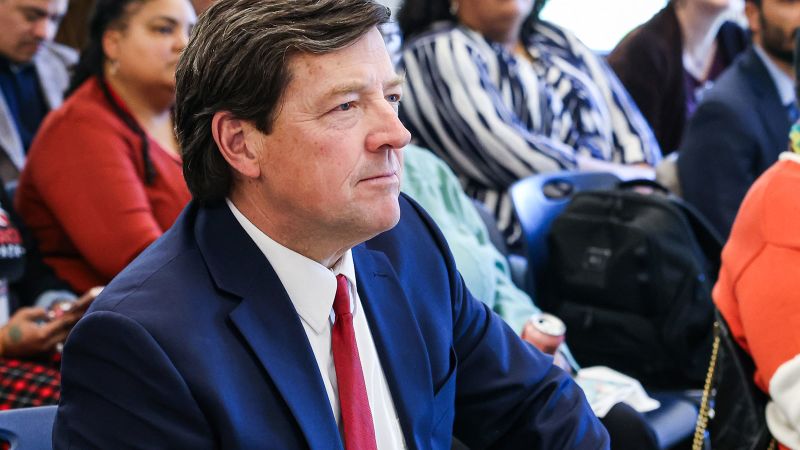In recent developments surrounding the nomination of Ed Martin as the U.S. Attorney for Washington, D.C., President Donald Trump is actively engaging Republican senators to garner support for his controversial pick. Sources indicate that Martin’s confirmation process has faced significant hurdles, prompting Trump to reach out personally to sway a few skeptical Republican members. The urgency of the situation is underscored by the impending expiration of Martin’s interim position, which is set to conclude by May 20.
The White House and the Department of Justice have taken an active role in guiding Martin through the turbulent waters of his confirmation, assisting him with compulsory disclosure forms and related paperwork. Despite this support, Martin’s nomination has been fraught with challenges. His initial disclosures revealed a failure to report nearly 200 media appearances, raising eyebrows among GOP senators. Furthermore, during recent testimony, Martin expressed an inability to recall significant past remarks, creating doubt about his candidacy among Senate Judiciary Committee members.
Leading Republican senators are treading carefully amidst the growing unease regarding Martin’s nomination. Chuck Grassley, the Chairman of the Senate Judiciary Committee, emphasized the need for additional time to vet Martin properly. This sentiment echoes among various GOP senators, including North Carolina’s Thom Tillis, who voiced “serious questions” about Martin’s past comments, particularly those disparaging the police who defended the Capitol during the infamous January 6, 2021 insurrection.
Amid mixed support, several other committee members, such as Senators John Cornyn and Ted Cruz, have also shared concerns privately about backing Martin. Cornyn has noted that Trump has not reached out to him regarding the nomination and remained discreet about his potential vote. The apprehension from within the Republican Party demonstrates the growing division surrounding Martin’s controversial history and makes the likelihood of confirmation uncertain.
Progress on the nomination has yet to crystallize into a scheduled committee vote, although insiders claim that the White House remains optimistic about Martin’s approval. A key factor affecting this decision-making is the completion of the required FBI paperwork, which, as of recently, has been received by the committee. Nevertheless, the clock is ticking for Martin, and with his interim term nearing its end, any delay in confirmation could necessitate a fresh nomination process, effectively altering the landscape of D.C.’s top legal position.
The implications of Martin’s potential confirmation are significant, not only for Trump’s administration but also in the broader context of governance and law enforcement practices. Martin had previously fostered controversy due to his comments on various issues, including expressions of support for participants of the Capitol riot, which have ignited backlash and cast doubts on his ability to effectively serve as a non-partisan U.S. Attorney.
Although the Trump administration remains steadfast in its confidence regarding Martin’s performance in an acting capacity, the nomination remains contentious. Recently, a coalition of 23 Republican state attorneys general wrote to encourage action on Martin’s confirmation, illustrating the divide between party loyalty and the imperative for accountability in leadership roles. Trump ally Charlie Kirk also voiced support for advancing Martin’s nomination, further amplifying the internal party dynamics that are at play.
Throughout this nomination journey, the Justice Department has had to manage Martin’s public engagements cautiously. Despite resistance from certain officials who favored alternative candidates, support for Martin within the party apparatus is palpable, indicating a willingness to move past controversy despite the growing scrutiny of his past actions and statements.
As the narrative unfolds, it remains to be seen whether Martin will secure the necessary support to graduate from interim appointee to an officially confirmed U.S. Attorney for Washington, D.C. The outcome of this nomination could signal broader implications for Trump’s influence within the Republican establishment and the ongoing debate regarding qualifications and the vetting process of nominees in a highly polarized political environment.



